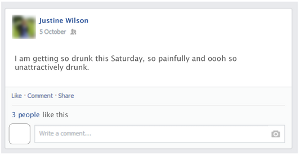
April 22, 2014, by Beth Dawson
Could your social media posts be jeopardizing your job hunt?
By Chris James Carter, PhD Researcher
Whether you’re in your final year and applying for positions or in your first year and researching internships for 2015, consider the prospect of employers searching for you online to assess whether you’re the type of person they want in their company. How likely is this to happen to you?
We explore one psychological theory that explains how social media can hinder job prospects and offer top tips for ensuring your profile reflects your potential.
Why do recruiters use social media?
According to the Advisory, Conciliation and Arbitration Service (ACAS), around half of UK-based organisations use social media in their recruitment processes and this number looks set to increase. They use social media in this way for a variety of reasons, such as gaining information about a candidate with relatively little time and effort (63%), obtaining information beyond that in a covering letter or CV (28%) and assessing whether an applicant is likely to fit into the organisation (34%).
What mistakes are job-seekers making online?
When you’re using social media to contact your friends, it’s easy to be unaware that what you’re posting could be viewed negatively by potential employers. For example, a US study identified that three key turn-offs for recruiters using social media to judge candidate suitability are: the use of profanity, poor grammar and spelling and indications of alcohol consumption.
What is psychological distance and what does it have to do with social media posts?
One explanation for why we may differ in the extent to which we post things that could harm employment prospects without realising is the theory of psychological distance.
This is the idea that the distance with which we think about something happening – how likely it is to happen, whether it will affect you or others and how soon it’s likely to happen – effects the way we behave in response to that event. For example, two people might have the same graduation date, but the one who perceives it as closer would be expected to take actions such as ordering their gown, making guest arrangements and talking to a careers adviser.
I explored this theory in my study
I conducted an online study with a sample of 257 final year students – 47% studied at Nottingham – looking for work this academic year. Participants were asked questions to gauge how likely they thought employers looking at their Facebook profiles is and then asked to rate how risky they thought a set of mock Facebook posts would be to their career prospects, if found on their own timeline.
When student job seekers perceived employers looking at their profiles as psychologically close, they tended to rate the Facebook posts as more risky and vice versa when the event was perceived as distant.
Interestingly, this relationship was observed when posts were related to anti-social behaviour, such as swearing or using derogatory language, but not when related to stylistic aspects like spelling and grammar.
The study suggests that job-seeking students vary in the extent to which they view content perceived negatively by employers as risky. Psychological distance does seem to play a role here. In particular, students that think employers looking at their profiles as being distant in time or unlikely to ever happen seem to perceive less professional risk which could lead to allowing career-limiting content onto their profiles.
What can you do?
If you’re looking for jobs and think that your profile might be presenting a poor professional image, you can take some easy steps to improve your social media presence.
- Change the privacy settings on your Facebook profile, so only friends can see your posts and photos. This way, if content that could be professionally risky does creep onto your profile, you’ve taken measures to prevent employers seeing it.
- Mention your membership of a professional body and involvement with volunteering projects on your profile. According to OnlineColleges, 80% of recruiters are positively influenced by evidence of memberships with professional organisations, while 66% like to see mentions of volunteerism.
- Use a professional looking profile picture. On social media platforms, this will often be an employer’s first impression of you – so make sure that impression isn’t informed by a picture of you in a nightclub!
- Check the spelling of your posts before they go into the world. It only takes a few seconds, but demonstrates your care and attention when communicating with others.
- Be proactive, use your online profile to your advantage. Look on our website to find out how out how you can utilise your online presence for networking purposes.
If you want to learn more about making the most of making the most of social media during your job hunt, see our online networking webpage.
No comments yet, fill out a comment to be the first


Leave a Reply